I Was A Teenage Exocolonist Review
A coming of age story about love, loss, and intergalactic space settlement

The last glow of my nineteenth year was melancholic. Maybe it was the physical and emotional absence of many friends from the past , or perhaps it was just the weight of adulthood slowing creeping up.
I Was A Teenage Exocolonist is a deck building RPG developed by Northway Games and published by Finji. In this game you play as the the first generation born on the Stratospheric, which has set course to land on the planet of Vertumna to start a new colony. Your character starts at age ten and the game ends as soon as you hit your twentieth birthday. Throughout the game you live through major story events to gain “memories” which take the shape of playable cards which you use to pass challenges and overcome hardships in your characters life.
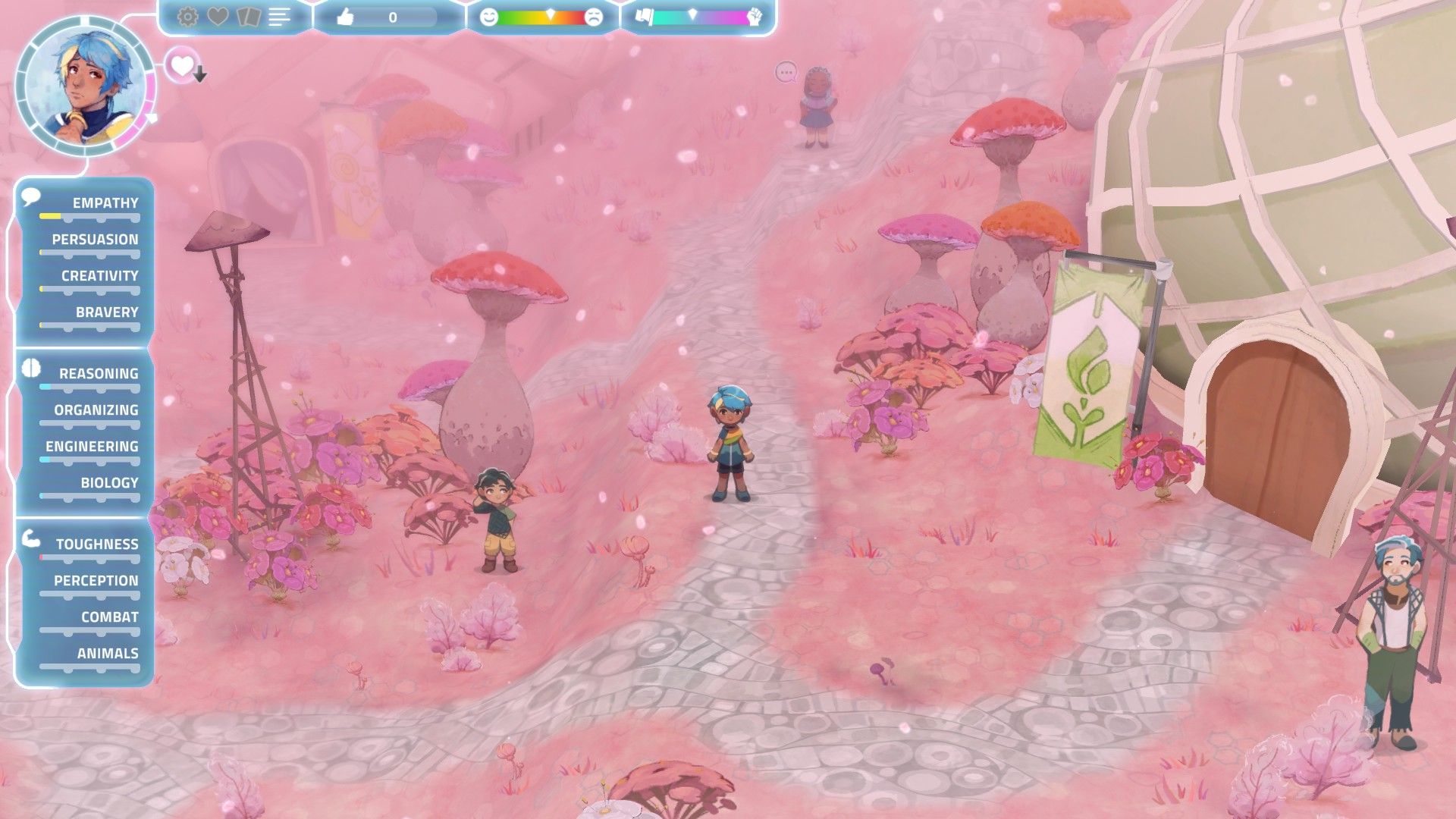
Let's discuss the gameplay first. Over the course of the game you are trying to tune a deck of cards to succeed in story challenges, and you do this by drawing a hand of cards out of your deck and then finding the best set and order of five cards that you can to achieve the most points. The points are awarded based on the rules of poker hands; each card has a suit and a number, and to gain points you have to create pairs, straights, and flushes to push your score higher and higher. You can perform the many activities around your camp in the hopes to add and subtract cards from your deck of memories in order to make your success easier, as well as buy accessories from the shop to give yourself buffs to your score for every challenge.
I love the card system in this game. It rewards you in a meaningful way for your choices in the story and is a fast and fun way to mix up what is typically a stat check or dice role in games like Persona or Pathfinder. I found this system to be challenging and in many situations I had to use consumable items to pass tests on the normal difficulty up until I was about 16 or 17 (although I play a lot of deck building games and I’m no stranger to poker). I was completely unstoppable after getting the chance to get all of the starting cards out of my hand, focusing on (mostly) one suit, and getting a certain fidget spinner item that makes all of my card values wild. There is a hard mode however and I would strongly suggest that every person familiar with deck building card games just go straight for that difficulty and I’ll dive into why that is a little further down.
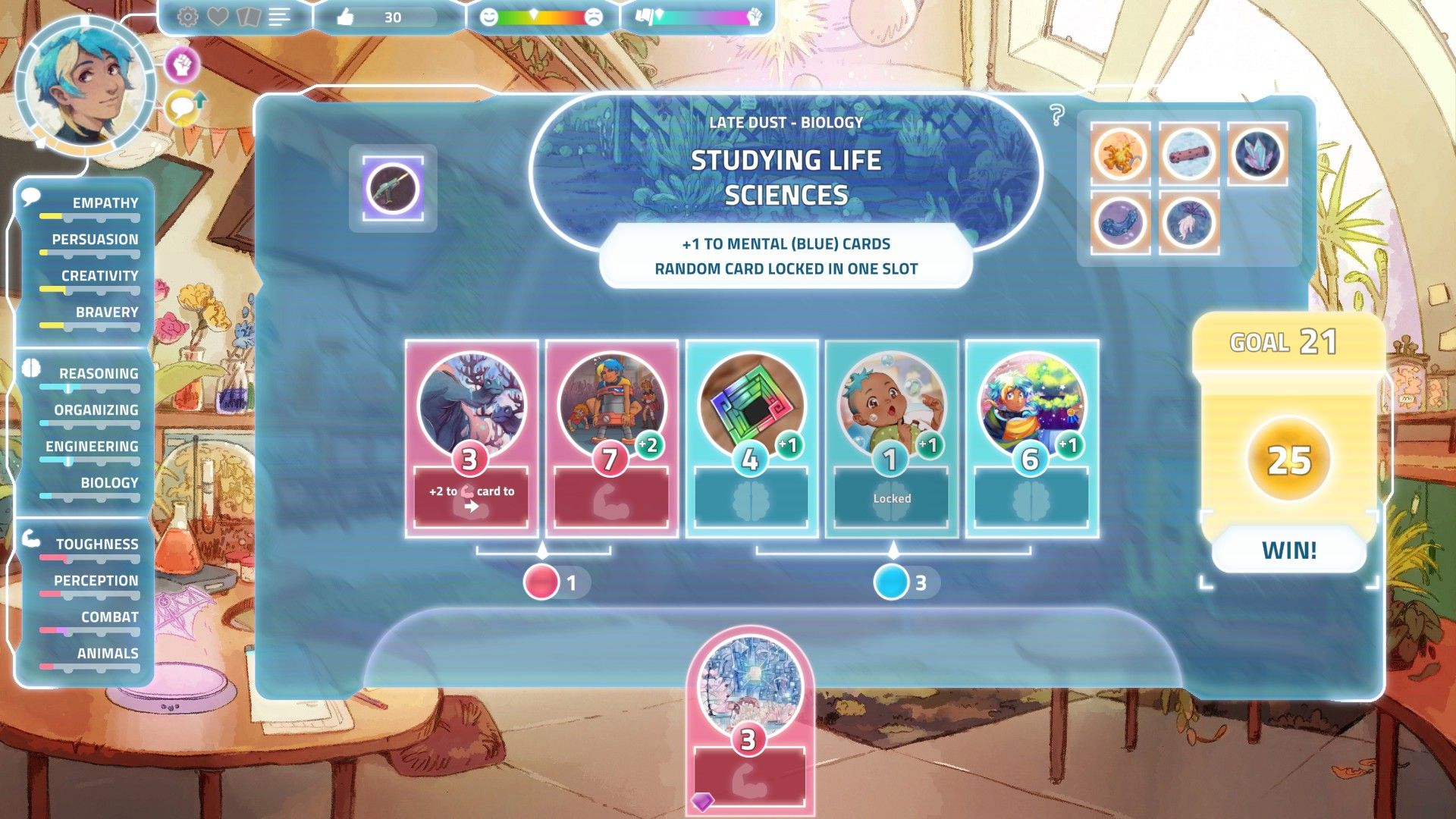
My only real problem with the card system is that your card composition starts to matter less and less the more you play the game. Through the rules of poker, you are destined for success as long as you keep away from spreading out between too many colors. This is good because you don’t have a large amount of agency when it comes to the cards you are putting into your deck, but it does make the process just a hint more mindless as you approach the last third of the game. The colors also don’t feel all that different from each other mechanically when played. This has no other affect than making me feel a little unmotivated to play the game another time until I am ready to experience the story again as the card game play would feel the same but with red cards instead of blue.
I Was A Teenage Exocolonist is an art collaboration between many people and the game is very deliberate about this which is refreshing to see. Every card is stamped with its creators tag; when you pause the game the current song is credited to the performer, and even in the credits most of the artists that worked on the game have links to their profiles that you can click on. Card games tend to be very art heavy and it is not unusual to see many people work on the same game. I did find that the stark contrast between art styles on some of the cards to be a little jarring at times but most of the cards have good art that I wish was larger or more prominent on the card. In Magic The Gathering, basic land cards have no text, and we are now seeing many prints of those cards to be formatted to remove the text box to instead display art across the whole card. In I Was A Teenage Exocolonist, most of the cards don’t have text on them, and as small of a gripe as it may seem, I would have loved to see something similar implemented here.
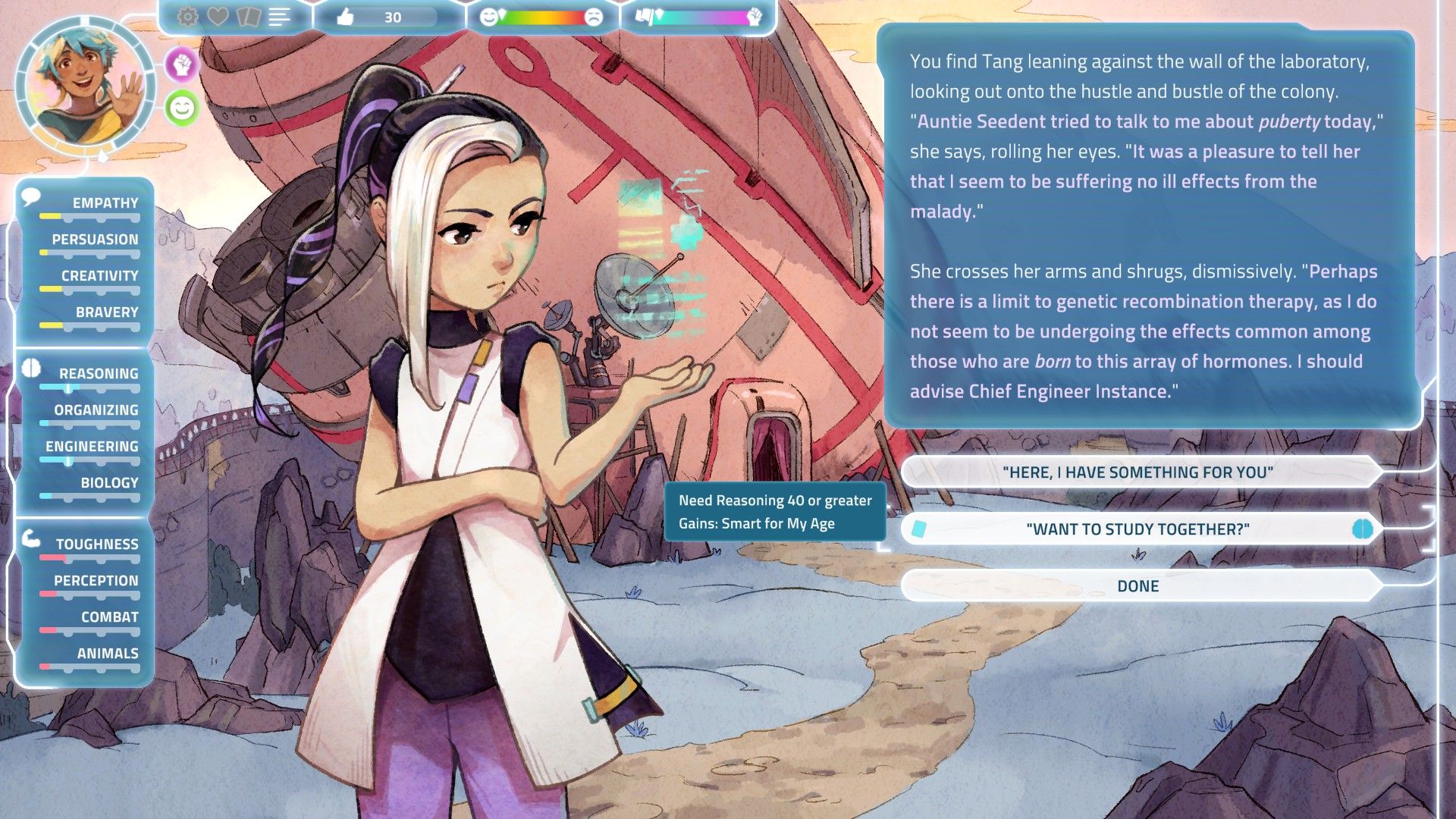
Regardless of the card art, the actual over-world and dialog screens of the game feature beautiful art on full display. The changing seasons are a feast for the eyes and every character sprite is exceptionally well-crafted. For story reasons I typically wouldn’t like to role play a character down the military path, but it’s on my list of things to see now only because I wish I had gone on more expeditions so that I could see all of the beautifully crafted areas outside of the colony as I only saw about half on my engineer run. This art paired with a great selection of relaxing synth music gives the colony a strong sense of character that strives to hit the same sense of familiarity that a Persona game gives.
I do want to draw comparisons with Persona for a moment because that is something that was on my mind a lot while playing this game, and with the recent popularity of Persona in the last six years, I am sure it was on the minds of many other fans of this type of time management sim as well. I Was A Teenage Exocolonist was built on the same foundation that makes a Persona game so addicting. The idea of saying “just one more day” before saving and quitting for the day.
I think two big things set this game apart from Persona to create its own identity.
The first being that this game takes place over ten years rather than Persona’s single year. This is important because it changes the dynamic of all the characters as people grow and change, allowing the writers to tell a much more harrowing and insightful tale of youth rather than detail the day to day urges and emotions of the teenager as is on display in Persona. The second and more differentiating thing that grounds I Was A Teenage Exocolonist in its original setting is its stress system. While doing your activities each year you will have to take around one or two months to relax, you don’t get any stats from doing this although you do have the option to cut cards from your deck. This is in stark contrast from Persona’s “make every day count” mentality. It makes you take a step back and remember those words from the tutorial that assured you that you won’t have time to do everything, so make sure to take your breaks.
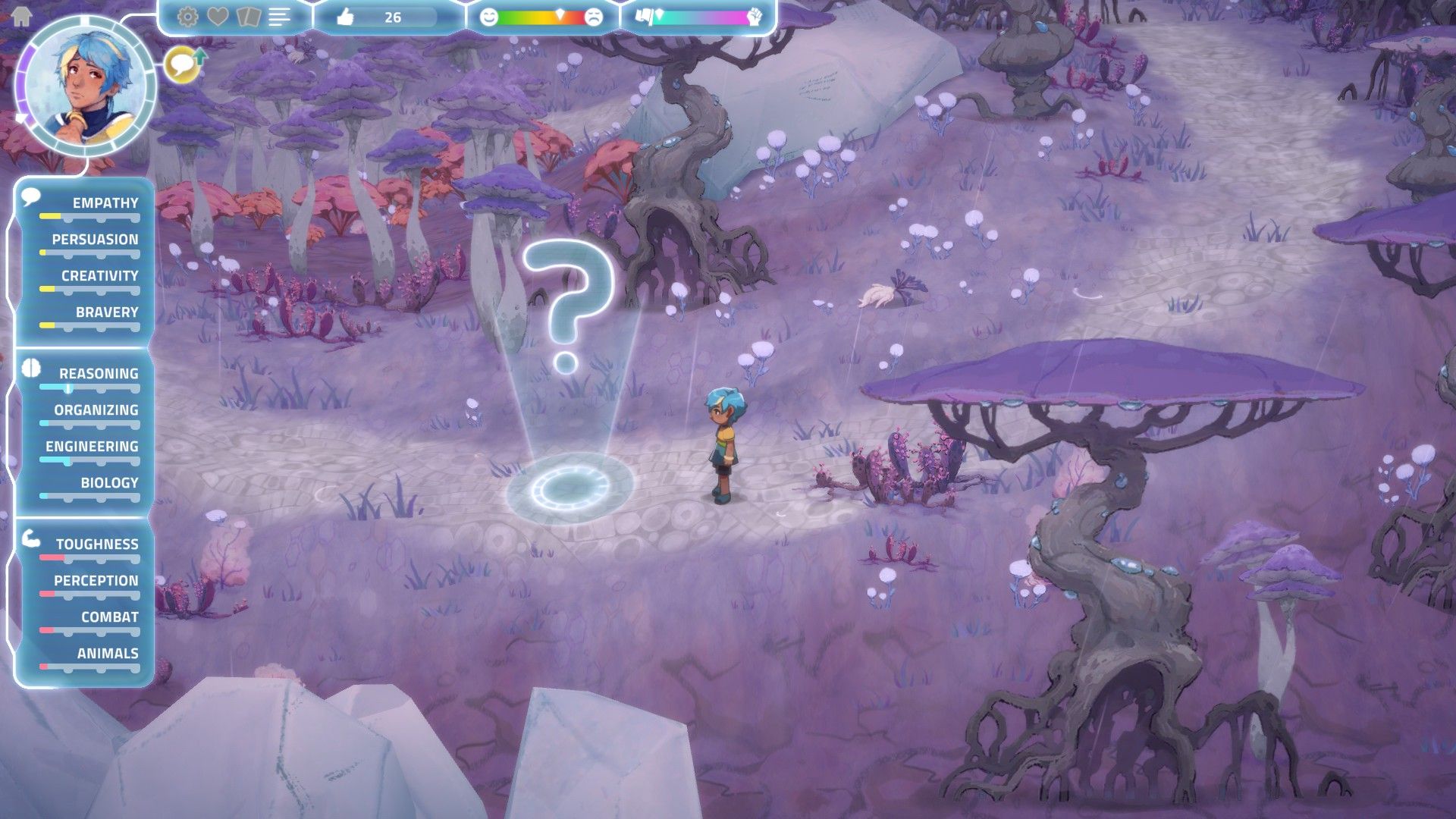
I think that Persona has a perfect formula for the "time manager" concept; it's a game that takes place over a year and contains the external character motivation to facilitate the panic of not being able to complete everything in time. I Was A Teenage Exocolonist brilliantly adapts this outline into a game that tells you that you have ten years and you won’t get to do everything, and that’s okay. There is also less pressure when thinking about replaying I Was A Teenage Exocolonist to optimize time a bit better as the game is only ten hours in contrast to Persona 5’s one hundred hour time commitment.
I Was A Teenage Exocolonist has one of the best stories that I have ever experienced featured in a video game, period. The writing in this game is filled with insightful prose that manages to almost never feel romanticized or over explained as visual novels tend to be. Every character is written with reverence to the archetype of person that they are giving representation to. You can date characters in this game, but it is very clear over the course of this game that these characters do not exist so that you have something to try and romance. The cast of I Was A Teenage Exocolonist is brimming with self-autonomy and give the games setting life as you realize how much of their existence does not revolve around you as a player. This level of writing offers the player a role playing experience that is natural, any person playing and reading every word of dialog will find themselves easily sucked into the contained world that Northway Games has created.
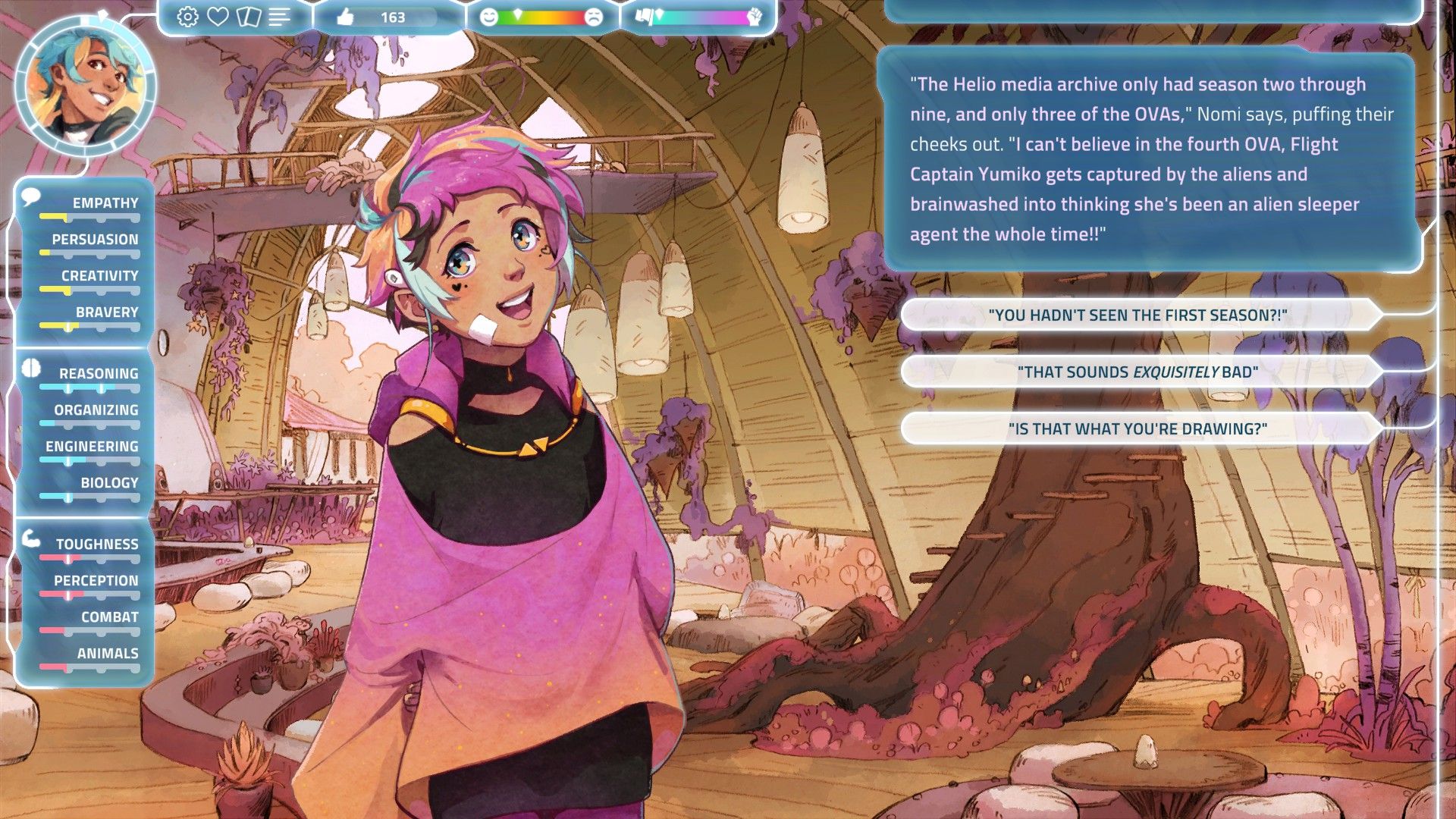
This was possibly the first time while playing a game with choices that I felt truly released from making “the right choice”. In the tutorial of the game, you are told that you are not meant to succeed in every challenge. I save scrubbed maybe once and that was only because I got eaten and I conceded to the fact that I made a pretty out of character decision anyways that I wouldn’t mind pretending didn’t happen. But the auto-save feature is really generous and if that is how you want to play. The games handling of character emotion (both the NPC cast and the player) is handled so expertly that I felt that every funeral to every weird thing I accidentally said when I was 14 helped shape this character that I was growing up as in interesting and powerful ways.
One of the most surprising things about I Was A Teenage Exocolonist is how loss, grief, and shared trauma are displayed within its story. I had never played a game where you are told someone died and then the prompts ask you how you feel about that. Every low moment hits hard and there were many moments in the story where I didn’t know how the colony was going to recover from this. To bring the review back to the card game, this is why I think that everyone should play the game on hard if they are familiar with the basics. In my run, my failures packed an emotional punch that I didn’t get often playing on normal, and I wish that my character had known the trials of failure more often. I think this game is at its best when you are fighting tooth and nail for every success and getting to feel every loss for what it is.
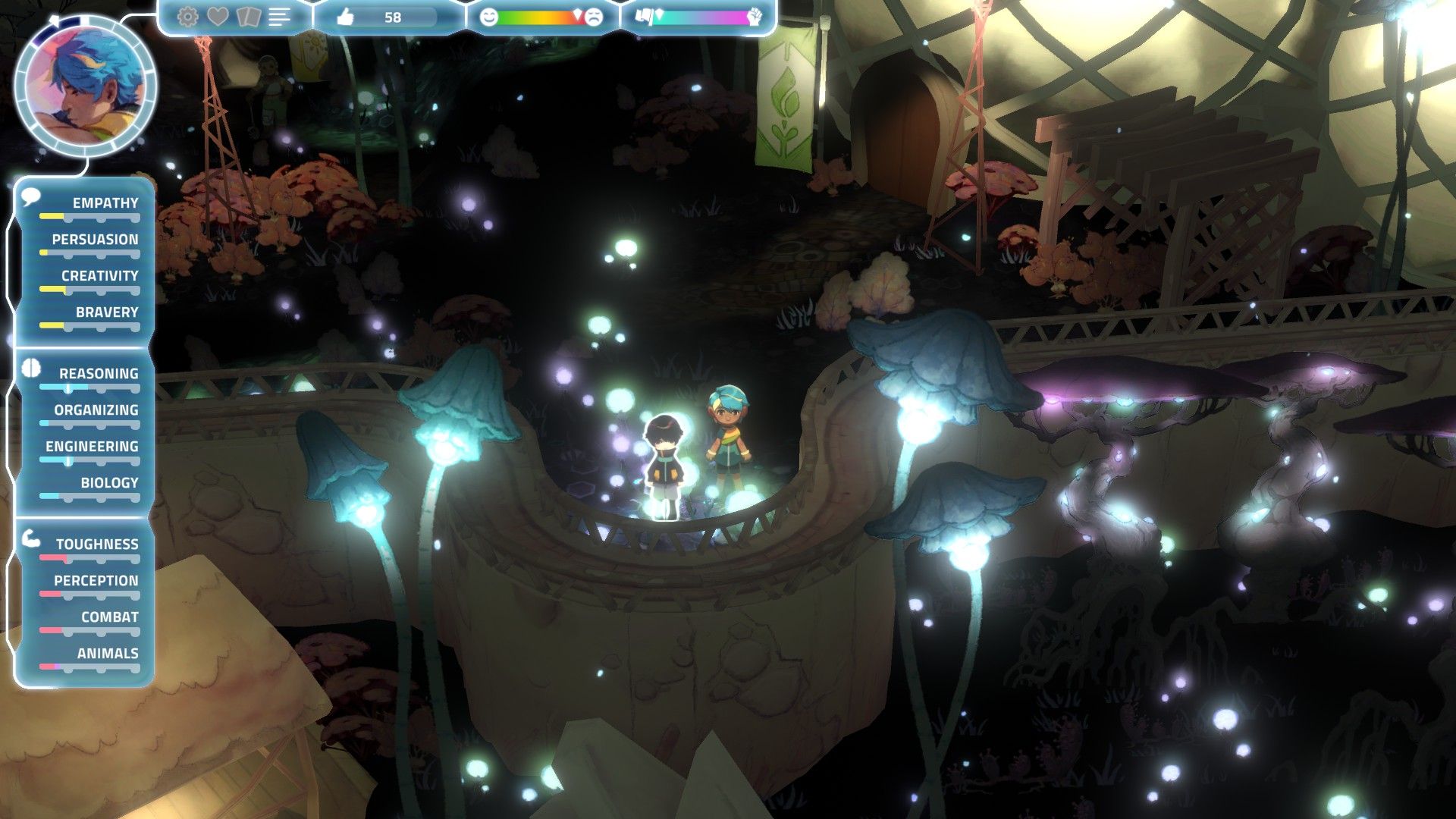
Through my late teenage years in the game I had finally got my relationship with my best friend from my childhood up to max level; this made my chances of going out with them all but secured. It got to the moment of truth and the game gave me the option to finally pop the question, but I hesitated a little, and hesitating a little turned into hesitating a lot. This character on my screen and my character were not kids anymore but practically adults and we had grown into people that were not as like minded as they once were as kids. I gave it up, and we remained best friends into my characters prologue, which ended up feeling very satisfying anyways. And there was something really cathartic about that, like an Uncharted game where he works so hard to get the treasure but it ends up slipping through his fingers anyways.
That’s the really special thing about I Was A Teenage Exocolonist. It’s not a fulfilling dating sim, time management sim, card game, or visual novel. This is a brilliant role playing game where the role you play is a teenager living ten years of laughter, heartbreak, tough lessons, and maybe a little romance. I would easily recommend this game to anyone looking for something with meaningful decisions that don’t just manifest in the world physically, but also manifest internally in you the player and the characters that inhabit Vertumna.
